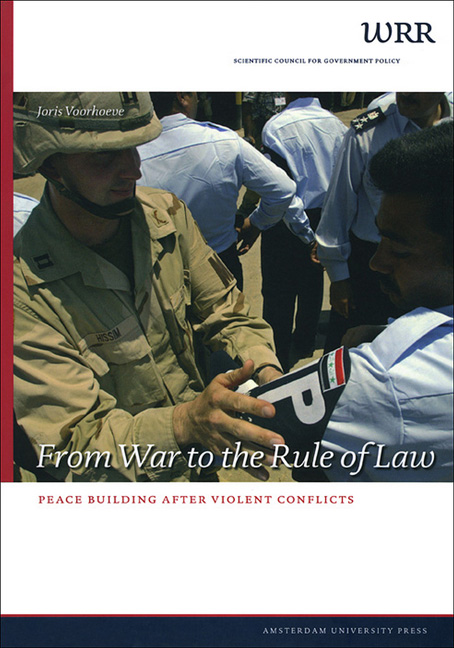Book contents
- Frontmatter
- Dedication
- Contents
- Preface
- 1 Why this Study?
- 2 An Overview of Peacebuilding
- 3 Towards Typology and Theory
- 4 (Re) Establishing Order
- 5 (Re) Building the Rule of Law
- 6 Resources and Costs
- 7 The European Union and Post-Conflict Peacebuilding
- 8 Conclusions and Recommendations
- List of Country Illustrations, Tables, Text Boxes and Maps
- Acknowledgments
- Further Reading
- Some Relevant Websites
8 - Conclusions and Recommendations
Published online by Cambridge University Press: 14 January 2021
- Frontmatter
- Dedication
- Contents
- Preface
- 1 Why this Study?
- 2 An Overview of Peacebuilding
- 3 Towards Typology and Theory
- 4 (Re) Establishing Order
- 5 (Re) Building the Rule of Law
- 6 Resources and Costs
- 7 The European Union and Post-Conflict Peacebuilding
- 8 Conclusions and Recommendations
- List of Country Illustrations, Tables, Text Boxes and Maps
- Acknowledgments
- Further Reading
- Some Relevant Websites
Summary
What can be learned from the previous exploration of many attempts at peacebuilding and rule of law reform? How can policies be improved? There are neither sound-bite lessons nor quick fixes. We can only try to give an overview, based on our still incomplete reading of case studies (in 2005-7) and visits to a number of peacekeeping and peacebuilding operations (in the period 1984 – 2005). We refer to the limitations set out in chapter 1. Recent, very sobering experience in Iraq and Afghanistan could only be partially included. This exploration was written during the ongoing operations in those countries. These two unfolding, vexing cases and many current emergencies in Africa deserve further study. It seems possible, however, to give, on this incomplete basis, some suggestions for future improvement of peacebuilding operations.
GENERAL CONCLUSIONS
What can be observed in many peacebuilding programmes for helping countries establish rule of law after (civil) wars could be summarised as follows: the efforts are too little, too late, too short, too fragmented and too foreign. Yet peacebuilding projects are very necessary for humanitarian reasons (human security). They are extremely valuable investments in socio-economic progress.
1. The cost of a standard complete UN peacebuilding operation in a low-income country of 10 million inhabitants with the consent of the parties during 10 years is estimated at € 1.8 billion a year. The cost of a heavy complete peacebuilding operation with military enforcement in a similar country but a hostile environment is estimated at € 16 billion a year. We refer to section 6.8 for the sources, calculations and assumptions. If the world community undertook one heavy (green-helmet) and nine standard (un blue-helmet) peacebuilding operations lasting on average 10 years in countries totalling 100 million people, the annual cost would amount to 3 percent of global military and development aid expenditures. Most of the states that enjoy peace themselves have a large financial and military capacity for peacebuilding in troubled states. At present, only 1.5 percent of active military troop strength in the world is used in all peace operations combined (even including the heavy us involvement in Iraq, which is not a UN peace operation.) These orders of magnitude show that UN peacebuilding operations need not be excessive in cost and may, on the contrary, be excellent investments in stability, rule of law, and human and economic progress.
- Type
- Chapter
- Information
- From War to the Rule of LawPeace Building after Violent Conflicts, pp. 167 - 192Publisher: Amsterdam University PressPrint publication year: 2007



